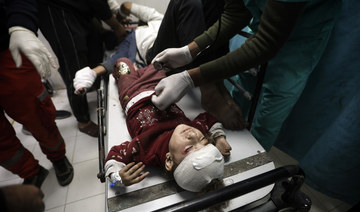GAZA STRIP: The Hamas-run Gaza Strip’s health ministry said Wednesday the death toll from the war with Israel now tops 21,000, with a spokesman reporting 195 deaths over 24 hours.
Israel again pounded Gaza with air strikes and shelling after its military chief warned the war raging with Hamas since the Palestinian group’s October 7 attacks will last “many more months.”
Explosions lit up the sky over the southern Gaza city of Khan Yunis — a focus of heavy urban combat since the Israeli army said it had largely gained control over Gaza’s north.
A strike hit a house near Al-Amal hospital in Khan Yunis, killing 22 people and wounding 34, the Gaza health ministry said.
Heavy firefights also raged again around Gaza City in the north, while an air strike wounded 11 people near Rafah, a far-southern city crowded with internally displaced people, witnesses said.
Gaza’s spiralling humanitarian crisis has amplified calls for an end to the hostilities.
Israeli Prime Minister Benjamin Netanyahu has repeatedly vowed to keep up the campaign to destroy Hamas, a group blacklisted as a “terrorist” organization by the United States and the European Union.
“This war’s objectives are essential and not simple to achieve,” armed forces chief Herzi Halevi said Tuesday. “Therefore, the war will continue for many more months.”
The conflict erupted when Hamas gunmen attacked southern Israel, resulting in the deaths of about 1,140 people, mostly civilians, according to an AFP tally based on Israeli figures.
Palestinian militants also took around 250 hostages, 129 of whom remain in captivity, Israel says.
Israel retaliated with a relentless bombardment and a siege of Gaza followed by a ground invasion from October 27.
The campaign has killed at least 21,110 people, according to the latest toll issued by Gaza’s health ministry, about two thirds of them women and children.
Israel’s army blames Hamas and its allied armed groups for the high civilian death toll, charging that fighters hide in schools, hospitals and other civilian infrastructure, or in tunnels below them.
The army said the number of Israeli soldiers killed inside Gaza had risen to 164.
Israel on Tuesday returned the bodies of 80 Palestinians killed in Gaza, after checking there were no hostages among them, via the Red Cross, sources in the health ministry said.
An AFP photographer witnessed a digger lowering the human remains in blue body bags into a mass grave in Rafah.
Gaza’s 2.4 million people have suffered severe shortages of water, food, fuel and medicines, with only limited aid entering the territory.
An estimated 1.9 million Gazans have been displaced, the UN says.
AFPTV footage showed Palestinians who had been sheltering in a UN-run school in central Gaza’s Nuseirat refugee camp fleeing south, seeking safety from the bombardment.
Displaced Gazans “don’t know where to go,” said one of them, declining to be named. “First, we’re displaced to Nuseirat, then to Rafah.”
Even schools “are no longer safe” in Gaza, said the man.
“A solution must be reached... Implement a ceasefire instead of bringing in aid.”
Palestinian president Mahmud Abbas, in an interview on Egyptian television, charged that the Gaza war “goes beyond a catastrophe and a genocide.”
“Netanyahu’s plan is to get rid of the Palestinians and the Palestinian Authority,” said Abbas, who is based in the occupied West Bank.
The UN Security Council, in a resolution last week, called for the “safe and unhindered delivery of humanitarian assistance at scale.”
The resolution, which did not call for an immediate end to the fighting, effectively leaves Israel with operational oversight of aid deliveries.
In Rafah, hundreds turned up at the Abdul Salam Yassin water company carrying baskets, pulling handcarts and even pushing a wheelchair stacked with bottles to queue for clean water.
“This was my father’s cart,” said Rafah resident Amir Al-Zahhar. “He was martyred during the war. He used it to transport and sell fish, and now we are using it to transport fresh water.”
Elsewhere in Rafah, people split logs and stacked kindling as the lack of fuel forced them to burn wood for cooking and to keep warm.
Internet and telephone services that were cut on Tuesday were gradually being restored in central and southern areas of Gaza, the Palestinian telecommunications company Paltel said on X, formerly Twitter.
Violence has also flared across the West Bank, with more than 310 Palestinians killed by Israeli troops or settlers since October 7, the health ministry there said.
An Israeli operation in a refugee camp in the northern West Bank killed six people early Wednesday, it said, with the army saying it had struck the Nur Shams camp from the air.
The war has reverberated across the Middle East, drawing in armed groups backed by Israel’s arch foe Iran in Lebanon, Iraq, Syria and Yemen.
An Israeli air strike on a Lebanon border town killed a Hezbollah fighter, the group said Wednesday, with state media reporting two of his relatives were also killed.
Hezbollah later Wednesday said it launched a barrage of 30 rockets toward northern Israel “in response to the enemy’s repeated crimes.”
In Syria, an Israeli strike Monday killed Iranian general Razi Moussavi, a senior commander in the Quds Force, the foreign operations arm of the Islamic Revolutionary Guard Corps.
Iran has vowed to avenge the death of Moussavi, whose body was due to be repatriated for burial after memorial prayers at the Shiite holy sites in Iraq on Wednesday.
Yemen’s Houthis have repeatedly fired at Israel and at passing cargo ships in the Red Sea in attacks in solidarity with Hamas.
US military forces shot down more than a dozen Houthi attack drones and several missiles, the Pentagon said, reporting no casualties or damage.
Israel’s military said Tuesday a fighter jet over the Red Sea had intercepted “a hostile aerial target that was on its way to Israeli territory.”
Gaza deaths soar as Israel says war to last ‘many more months’
https://arab.news/2vy4q
Gaza deaths soar as Israel says war to last ‘many more months’
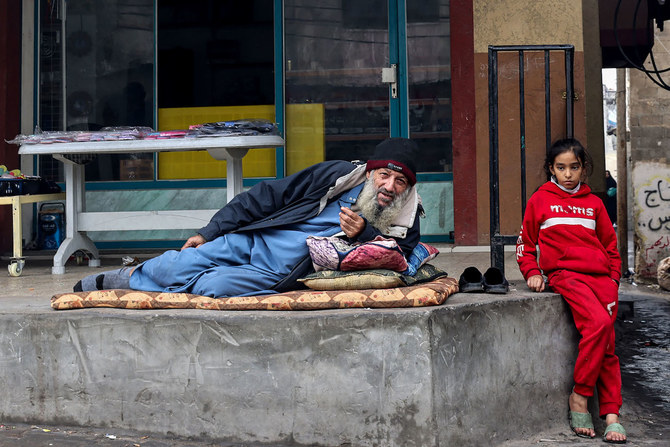
- A strike hit a house near Al-Amal hospital in Khan Yunis, killing 22 people and wounding 34, the Gaza health ministry said
- Heavy firefights also raged again around Gaza City in the north, while an air strike wounded 11 people near Rafah
Sudan facing ‘inferno’ of violence, crushing aid holdups: UN

- The grim situation is only expected to worsen
United Nations, US: Residents of conflict-hit Sudan are “trapped in an inferno of brutal violence” and increasingly at risk of famine due to the rainy season and blocked aid, the UN’s humanitarian coordinator for the country warned Wednesday.
Tens of thousands of people have died and millions have been displaced since war broke out in April 2023 between the army and the paramilitary Rapid Support Forces (RSF).
“Famine is closing in. Diseases are closing in. The fighting is closing in and there’s no end in sight,” Clementine Nkweta-Salami told a press conference.
The grim situation is only expected to worsen, with “just six weeks before the lean season sets in, when food becomes less available, and more expensive.”
Noting that more than four million people are facing potential famine, Nkweta-Salami added that the onset of the country’s rainy season means that “reaching people in need becomes even more difficult.”
The area’s planting season also “could fail if we aren’t able to procure and deliver seeds for farmers,” she said.
And “after more than a year of conflict, the people of Sudan are trapped in an inferno of brutal violence.”
“In short, the people of Sudan are in the path of a perfect storm that is growing more lethal by the day,” Nkweta-Salami warned, adding that the humanitarian community needs “unfettered access to reach people in need, wherever they are.”
The United Nations has expressed growing concern in recent days over reports of heavy fighting in densely populated areas as the RSF seeks control of El-Fasher, the last major city in the western Darfur region not under its control.
“Right now the humanitarian assistance they rely on can’t get through,” Nkweta-Salami said.
More than a dozen UN trucks loaded with medical equipment and food, which left Port Sudan on April 3, have still not reached El Fasher, she said, “due to insecurity and delays in getting clearances at checkpoints.”
Israel PM says no humanitarian crisis as hundreds of thousands flee Rafah

RAFAH, Palestinian Territories: Israeli Prime Minister Benjamin Netanyahu on Wednesday insisted there was no “humanitarian catastrophe” in Rafah, even as hundreds of thousands fled the south Gaza city amid intense fighting.
Hamas meanwhile insisted it would take part in any decision on the post-war government of Gaza as Palestinians marked the 76th anniversary of the “Nakba,” when around 760,000 Palestinians fled or were driven from their homes during the 1948 creation of Israel.
Israeli forces have bombed Hamas militants around Gaza’s far-southern city of Rafah, but clashes have also flared again in northern and central areas which Israeli troops first entered months ago.
The upsurge in urban combat has fueled US warnings that Israel, which launched its war after the October 7 Hamas attacks, risks being bogged down in years of counterinsurgency.
But despite previous threats by US President Joe Biden to withhold some arms deliveries over Netanyahu’s insistence on attacking Rafah, his administration informed Congress on Tuesday of a new $1 billion weapons package for Israel, official sources told AFP.
The European Union urged Israel to end its military operation in Rafah “immediately,” warning failure to do so would “inevitably put a heavy strain” on ties with the bloc.
But even as he announced that hundreds of thousands had been “evacuated,” Netanyahu insisted there was no humanitarian crisis in Rafah.
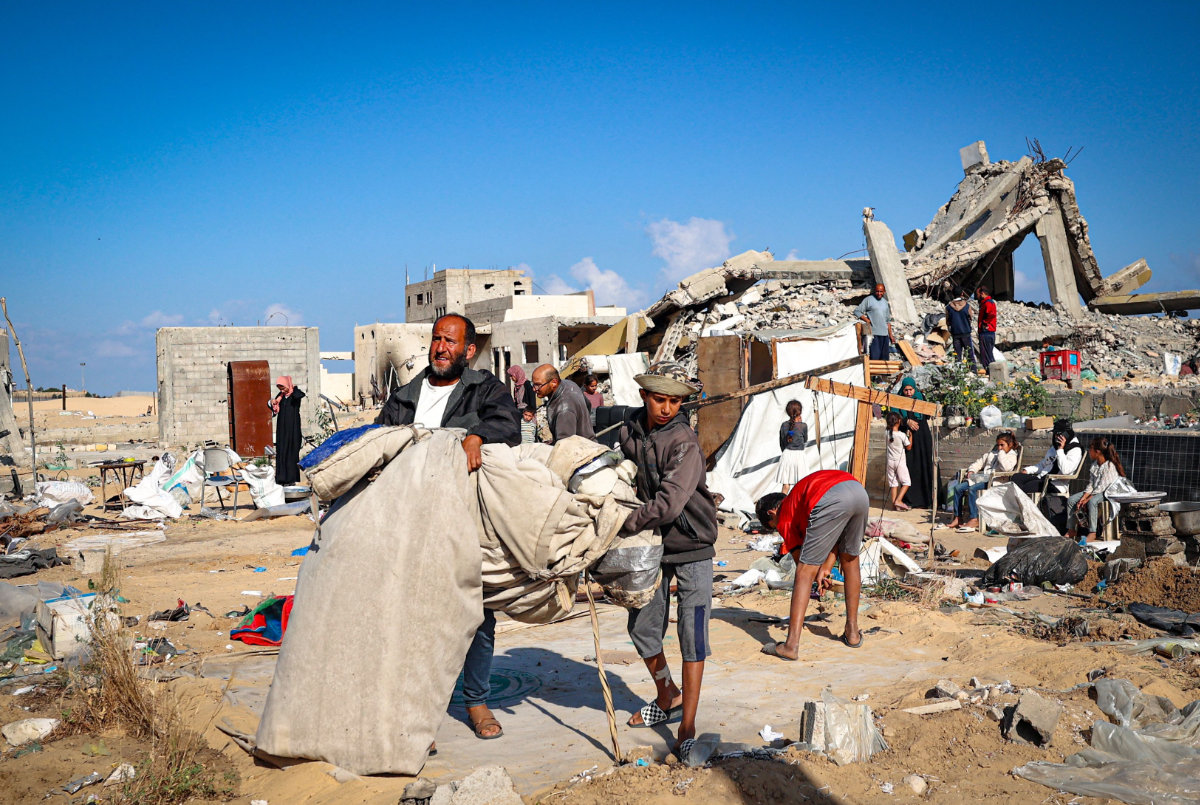
“Our responsible efforts are bearing fruit. So far, in Rafah, close to half a million people have been evacuated from the combat zones. The humanitarian catastrophe that was spoken about did not materialize, nor will it,” he said.
The United Nations agency for Palestinian refugees, UNWRA, meanwhile said “600K people have fled Rafah since military operations intensified.”
Nakba Day
The sight of desperate families carrying scant belongings through the ruins of war-scarred Gaza cities has evoked for many the events of the 1948 Nakba which translates from Arabic as “catastrophe.”
Hamas declared in a Nakba Day statement that “the ongoing suffering of millions of refugees inside Palestine and in the diaspora is directly attributed to the Zionist occupation.”
Hamas chief Ismail Haniyeh insisted meanwhile that the militant movement will be involved in deciding post-war rule in Gaza along with other Palestinian factions.
“We say that the Hamas movement is here to stay ... and it will be the movement and all national (Palestinian) factions who will decide the post-war rule in Gaza,” Haniyeh said in a televised address for Nakba.
He also said the fate of truce talks was uncertain because of Israel’s “insistence on occupying the Rafah crossing and on its expansion of the aggression” in the Palestinian territory.
“Any agreement must ensure a permanent ceasefire, comprehensive withdrawal (of Israeli forces) from all sectors of the Gaza Strip, a real deal for exchange of prisoners, the return of displaced persons, reconstruction and lifting the siege” of Gaza, Haniyeh said.
Thousands marched to mark the day in cities across the Israeli-occupied West Bank, waving Palestinian flags, wearing keffiyeh scarves and holding up symbolic keys as reminders of long-lost family homes.
Netanyahu has vowed to destroy Hamas and bring home hostages still held in Gaza.
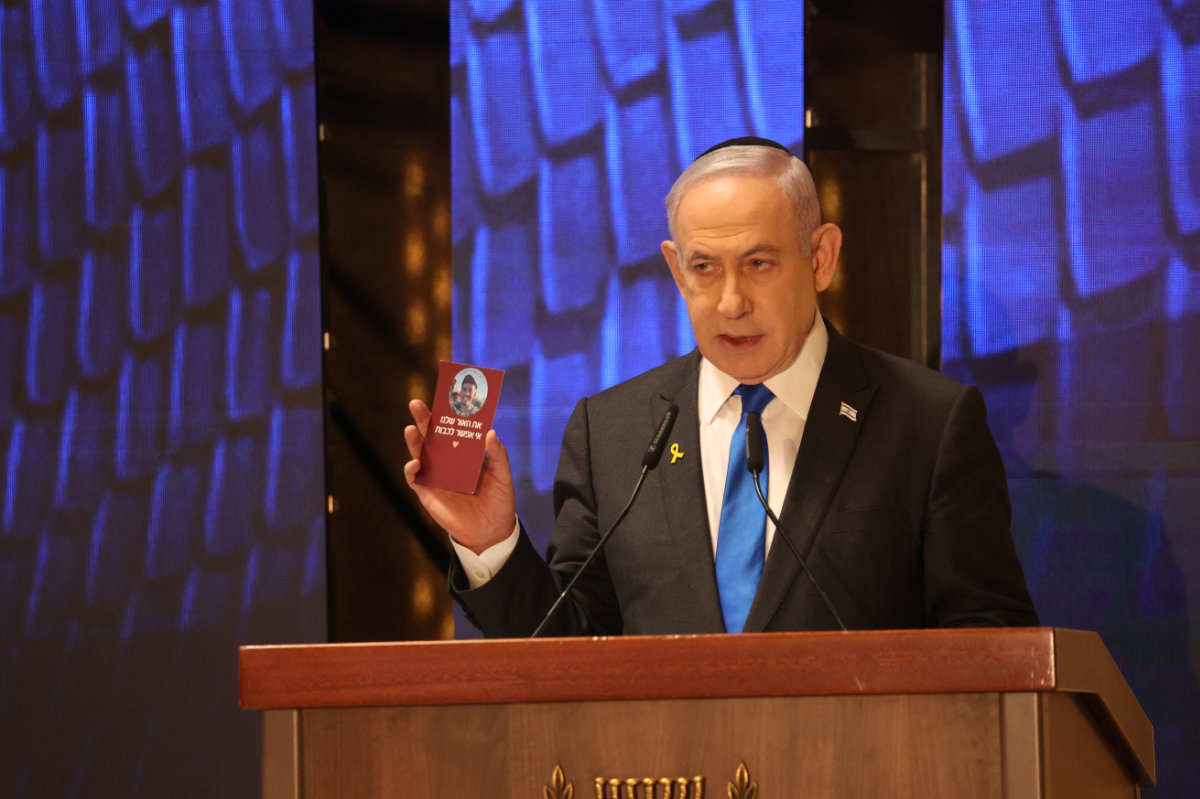
The United Nations agency for Palestinian refugees, UNWRA, meanwhile said “600K people have fled Rafah since military operations intensified.”
In a Wednesday interview with CNBC, Netanyahu addressed the tensions with Biden over the offensive, saying: “Yes, we do have a disagreement on Gaza. Rather, on Rafah. But we have to do what we have to do.”
Washington has also repeatedly urged Israel to work on a post-war plan for Gaza and supports the goal of a two-state solution, which Netanyahu and his far-right allies strongly oppose.
US State Department spokesman Vedant Patel said without a political plan, Palestinian militants “will keep coming back” trapping all sides in “this continued cycle of violence.”
Israeli Defense Minister Yoav Gallant on Wednesday said he would “not agree to the establishment of an Israeli military administration in Gaza, Israel must not have civilian control over the Gaza Strip.”
The war broke out after Hamas’s October 7 attack on southern Israel which resulted in the deaths of more than 1,170 people, mostly civilians, according to an AFP tally of Israeli official figures.
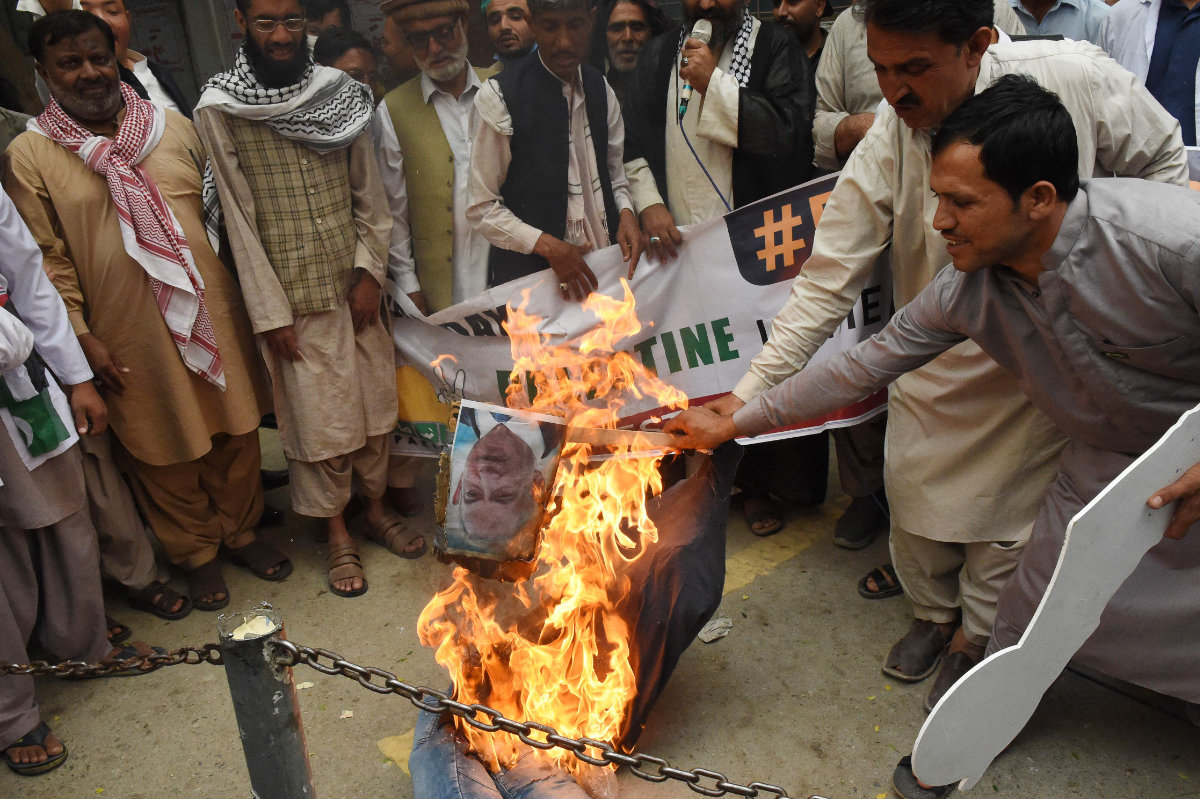
The militants also seized about 250 hostages, 128 of whom Israel estimates remain in Gaza, including 36 the military says are dead.
Israel’s military retaliation has killed at least 35,233 people, mostly civilians, according to the Gaza health ministry, and an Israeli siege has brought dire food shortages and the threat of famine.
Clashes continue
The Israeli military said Wednesday its aircraft had “struck and eliminated approximately 80 terror targets” including military compounds, missile launchers and weapons depots.
It also reported battles in eastern Rafah and in Jabalia in northern Gaza, where it said it had killed militants, adding troops were also fighting in the Zeitun area.
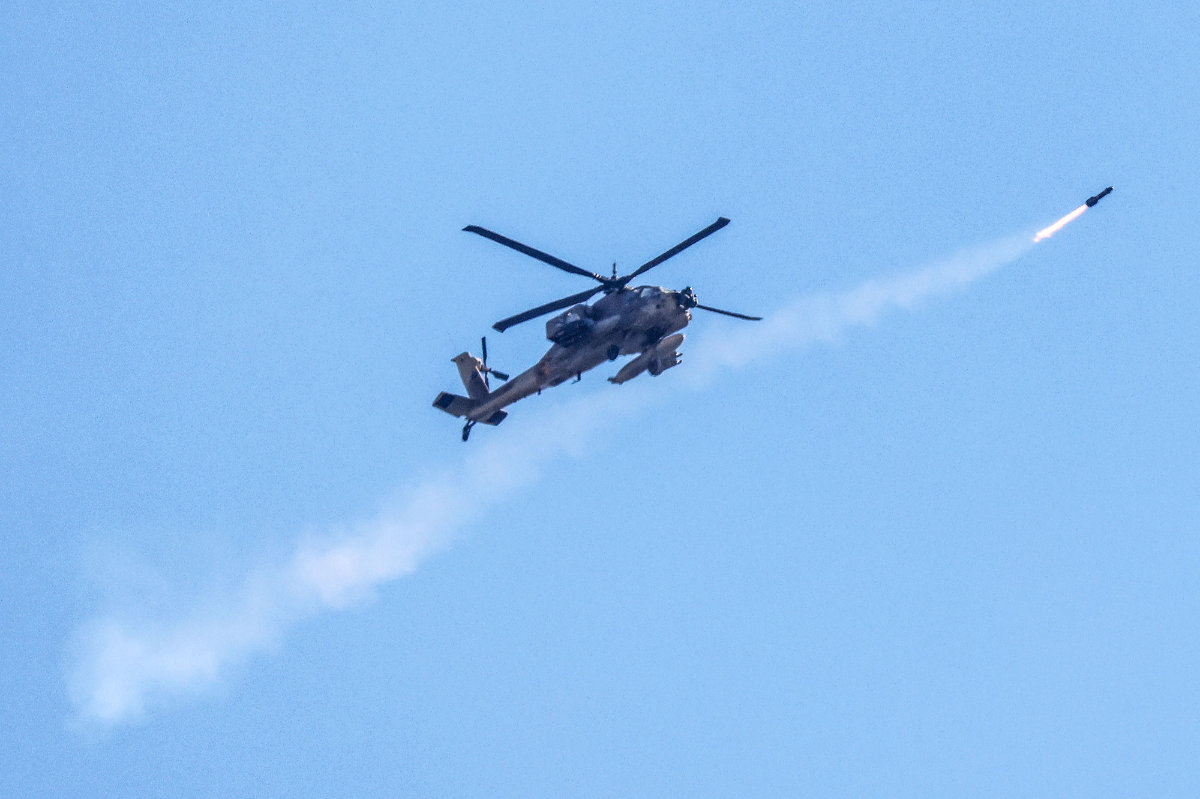
Hamas’s armed wing also reported its fighters were clashing with troops in the Jabalia area, much of which has been reduced to rubble.
At least five people were killed, including a woman and her child, in two Israeli air strikes on Gaza City overnight, Gaza’s civil defense agency said.
At the city’s Al-Ahli hospital, a wounded man, his bare chest smeared with blood, lay on a cot while outside several men placed a shrouded corpse in the shade of a tree.
Sporadic aid deliveries into Gaza by truck have slowed to a trickle since Israeli forces took control of the Gaza side of the Rafah crossing with Egypt last week.
A UK delivery of 100 tons of temporary shelter kits left Cyprus Wednesday on its way to a US-built pier in Gaza, Britain said.
Another convoy carrying humanitarian relief goods was ransacked by Israeli right-wing activists on Monday after it had crossed from Jordan through the West Bank.
Palestinians: Our ‘Nakba’ in 2023 is worst ever

- Thousands protest in West Bank, waving Palestinian flags, wearing keffiyeh scarves and holding up symbolic keys as reminders of long-lost family homes
GAZA: As the Gaza war raged on, Palestinians on Wednesday marked the anniversary of the Nakba, or “catastrophe,” of mass displacement during the creation of the state of Israel 76 years ago.
Thousands marched in cities across the Israeli-occupied West Bank, waving Palestinian flags, wearing keffiyeh scarves and holding up symbolic keys as reminders of long-lost family homes.
Inside the besieged Gaza Strip, where the Israel-Hamas war has ground on for more than seven months, scores more died in the fighting sparked by the Hamas attack of Oct. 7.
“Our ‘Nakba’ in 2023 is the worst ever,” said one displaced Gaza man, Mohammed Al-Farra, whose family fled their home in Khan Younis for the coastal area of Al-Mawasi.
“It is much harder than the Nakba of 1948.”
Palestinians everywhere have long mourned the events of that year when, during the war that led to the establishment of Israel, around 760,000 Palestinians fled or were driven from their homes.
But 42-year-old Farra, whose family was then displaced from Jaffa near Tel Aviv, said the current war is even harder.
“When your child is accustomed to all the comforts and luxuries, and suddenly, overnight, everything is taken away from him ... it is a big shock.”
Thousands marched in the West Bank city of Ramallah, as well as in Nablus, Hebron and elsewhere, carrying banners denouncing the occupation and protesting the war in Gaza.
“There’s pain for us, but of course more pain for Gazans,” said one protester, Manal Sarhan, 53, who has relatives in Israeli jails that have not been heard from since Oct. 7. “We’re living the Nakba a second time.”
Commemorations and marches — held a day after Israel’s Independence Day — come as the Gaza war has brought a massive death toll and the forced displaced of most of the territory’s 2.4 million people.
A devastating humanitarian crisis has plagued the territory, with the UN warning of looming famine in the north.
US working to get American doctors out of Gaza, White House says

- “We’re tracking this matter closely and working to get the impacted American citizens out of Gaza,” Jean-Pierre said
- The Biden administration has been warning Israel against a major military ground operation in Rafah
WASHINGTON: The Biden administration is working to get US doctors out of Gaza, White House Press Secretary Karine Jean-Pierre said on Wednesday, as fighting intensified in the seaside enclave.
A group of American doctors from the Palestinian American Medical Association told the Washington Post this week that they were stuck in Gaza after Israel closed the border crossing in the southern city of Rafah.
“We’re tracking this matter closely and working to get the impacted American citizens out of Gaza,” Jean-Pierre said.
Jean-Pierre said the United States was engaging directly with Israel on the matter.
The Biden administration has been warning Israel against a major military ground operation in Rafah, but Jean-Pierre said efforts to get the doctors out are continuing regardless of what happens there.
“We need to get them out. We want to get them out and it has nothing to do with anything else,” she said.
Israeli troops battled militants across Gaza on Wednesday, including in Rafah, which had been a refuge for civilians, in an upsurge of the more than 7-month-old war that has killed tens of thousands of Palestinians.
Gaza’s health care system has essentially collapsed since Israel began its military offensive there after the Oct. 7 cross-border attacks by Palestinian Hamas militants on Israelis.
Humanitarian workers sounded the alarm last week that the closure of the Rafah and Kerem Shalom crossings into Gaza could force aid operations to grind to a halt.
The Israeli assault on Gaza has destroyed hospitals across Gaza, including Al Shifa Hospital, the Gaza Strip’s largest before the war, and killed and injured health workers.
Egypt warns against consequences of Israeli escalation in Gaza

- During talks with Ayman Al-Safadi and Fuad Hussein, FM Shoukry said that there would be negative repercussions for regional stability if Israel continued to escalate its activities in Gaza
- Discussions in Manama took place on the sidelines of an Arabian foreign ministers’ meeting being held in preparation for the Arab Summit
CAIRO: Egypt’s Foreign Minister Sameh Shoukry has warned of dire consequences as a result of Israel escalating its activities in the Gaza Strip.
During talks with his Jordanian and Iraqi counterparts, Ayman Al-Safadi and Fuad Hussein, he also said there would be negative repercussions for the security and stability of the whole region.
The discussion in Manama on Wednesday took place on the sidelines of an Arabian foreign ministers’ meeting being held in preparation for the Arab Summit.
Shoukry talked about Egypt’s efforts to reach an immediate, comprehensive and lasting ceasefire in Gaza and its call for allowing immediate delivery of humanitarian aid.
He also stressed his country’s categorical rejection of any attempts to displace Gazans or kill the Palestinian cause.
He underlined the need to stop targeting civilians, halt Israeli settler violence, and allow aid access in adequate quantities “that meet the needs of our Palestinian brothers.”
During the meeting, Shoukry also reaffirmed Cairo’s support for the stability of Iraq and Jordan and emphasized the importance of implementing directives from the three countries’ leaders to boost cooperation within the framework of the tripartite mechanism.
He said Egypt viewed tripartite cooperation as a way to link the interests of the three countries and maximize common benefits. The discussion also underlined the importance of putting into effect agreed joint projects as soon as possible.
During a separate meeting with Iraqi minister Hussein, Shoukry reiterated the directives of President Abdel Fattah El-Sisi to develop relations between the two countries in various fields.
The Iraqi minister highlighted close historical ties with Egypt that required continued coordination on the various challenges plaguing the region. Hussein also hailed the key role played by Egypt to bring about an end to the crisis in Gaza.



